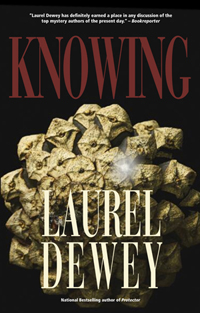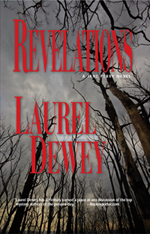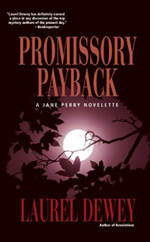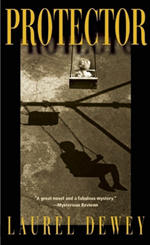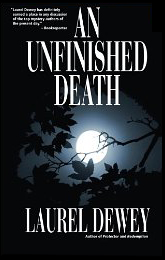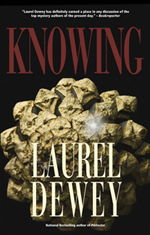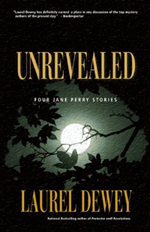
How many secrets does it take to curse a family?
How many revelations does it take to
set them free?
Q & A with Laurel Dewey about writing and developing Revelations.
What inspired you to write REVELATIONS?
Creativity is a strange and unpredictable muse. So much of what I’ve written has started with a character study that grows to the point where a story is built around that character. This is how Revelations started. I was on vacation with my husband in Maine in 2006. Walking alone in the woods one rainy morning, I imagined what it would be like if Jane Perry was next to me. I then imagined a tall, frightening man stepping quietly out from the trees and talking to us. What can I say? I was alone in the woods, it was softly raining and the air was infused with that creepy vibe. The more I imagined this strange man, his words and phrasing became oddly brilliant. His approach was brutally honest and wise in a way that was jarring. By the time I got back to house where we were staying, I told my husband that I’d just “met” the next featured character in the Jane Perry series. I later named him “Jordan Copeland.”
The story around Jordan Copeland evolved many times but the central theme of family secrets kept coming up for me. When I delved further into the idea of secrets within families, I learned of a rather obscure but fascinating esoteric therapy called “Systemic Constellation” work. A dear friend of mine became a facilitator in this therapy and I decided to personally experience it to see if it rang true for me.
Did you find that it was a valid therapy?
For me, very much so. It’s based on German psychotherpist Bert Hellinger’s work. In some circles, it’s extremely controversial because it speaks about deep-seated psychological issues that morph into hidden family secrets in the bloodlines and the possible unconscious causes and effects these have on subsequent generations. To simplify Hellinger’s theory — and this is highly simplified — when a family makes an agreement generations ago to keep a secret for a member of that family, the secret begins to take on a life of its own. As more children are born into that bloodline, the secret often continues to manifest in the same way it started. Future family members then feel the need completely unconsciously to “carry” that burden for the deceased family member.
Here’s an example: in the case of clandestine adoptions, there is a kind of unspoken blueprint in the family line of some family members continuing that pattern and keeping a child’s birth parent a secret from them. But what this does is create a massive disconnect with that adopted child who grows up feeling a sense of confusion. Deep down, they know something is not right...that they don’t belong to that particular family bloodline...and the more they are told that they are “imagining” what they are feeling, the more confused and disconnected they feel. Following this through and using Hellinger’s theory, that child can grow up and repeat the same pattern. In other words, they adopt a child and keep it secret from that child. And on and on it goes.
But the secret really wants to be discovered. It begs to be put into the light. When that happens, it loses its power over the family bloodline and is released. Of course, by doing the Systemic Constellation therapy work, an individual can create the proper alignment within themselves and within their family (even if their family does not take part in the therapy sessions) that will allow the deceased members of the family who suffered because of the secret, to finally be heard and be allowed to rest in peace, so to speak. Again, this explanation is really simplified.
Besides clandestine adoptions, what other types of family secrets did you find fit into this esoteric pattern?
Anything that is considered immoral or viewed as “wrong.” We’re talking incest, rape, sexual perversion, murder, suicide, homosexuality, children born with mental or physical birth defects, alcoholism and drug use, mental illness...anything that a family might feel is vital to keep secret in order to create a false front or hide illegal activities from society. Interestingly, alcoholism and drug use are not as stigmatized as they used to be. Thus, society has shown more compassion for addicts and the need to “keep it quiet” is not as fundamental as it was even forty years ago. Still, in certain cultures today, mental illness is hidden and denied. It’s not unusual for those who have the means, to send a family member away to a mental hospital and never speak about them again. This action can set up an “echoing” for future members of the family in the form of depression, anxiety and even more profound mental issues because, according to Hellinger’s theory, the suppression of the secret has to have a release somewhere in the family line. I’ve personally seen this pattern in several families who have long-buried secrets regarding mental illness and how it has crept right back up with the offspring. We’re talking depression or random anxiety that literally has no footing. In other words, the person who is depressed has no reason “on paper” to be depressed but for whatever reason, they are “carrying” that depression for a former family member who was not allowed to express themselves, and thus, their “mental demons” were suffocated but not killed in the bloodline.
This is a very compelling basis for a novel. How were you able to synthesize all of this into a crime thriller?
It wasn’t easy and it took me three years of research and burying my head in my hands many times wondering if I had the energy and ability to pull it off. I knew that the ex-convict, Jordan Copeland, would be the fulcrum for the book and the theme of family secrets. He’s basically the talking head who gives Jane Perry the background information on Hellinger’s work without mentioning Hellinger’s name. However, I did give Hellinger an acknowledgement in the front section of the book as well as a Systemic Constellation facilitator in Boulder, Colorado, Jan Rupp, who was influential in helping me condense the vast theories into useable bites that readers could understand and relate to.
I also decided that I would make everyone in the book have a secret. When I agreed on that premise, I decided to create a fictional Colorado town that is imbued with that same quality. I named the town Midas, not for the gold connection, but for the fable associated with King Midas and the theme of secrets associated with that.
What’s the fable?
Ah, you have to read the book to find out.
Okay. Done deal. I’ve read that REVELATIONS is considered the most “personal” Jane Perry novel so far. Why is this?
In the first Jane Perry novel, Protector, it was all about establishing who Jane was, why she acted the way she did, and creating a suspenseful story that would show readers what Jane Perry was capable of doing. In the second book in the series, Redemption, we see Jane moving out of her self-sabotaging mindset and attempting to reconcile her family’s cloudy history. The first two books, in my opinion, dealt a lot with Jane’s abusive past in regard to her father. In Revelations, it was necessary to take Jane even further emotionally and I wanted to focus on her deceased mother, who never really got much attention in the other two books. Consequently, as Revelations developed, I decided to create a clear feminine theme in that the various mothers in the book, both dead and alive, function as archetypes that represent how family secrets affect the females in the bloodline. This, of course, goes back to Jane Perry and I give her an extremely jarring personal struggle as well as a mystical connection with someone who reveals herself in a startling manner.
Is Jane Perry the ultimate feminist?
Oh, no, no, no. That’s not where I’m going with this. Revelations is in no way a “feminist” book or full of sacrosanct female characters. In fact, there are a couple women in the story that are not positive characters, with one of those being positively vile. Just because I’m using a feminine archetypal theme doesn’t mean I’m going to write about how “great” women are because not all women are wonderful. Some women are seriously vindictive, manipulative and evil and that’s demonstrated via a character in the story.
Does Jane Perry soften at all in REVELATIONS?
Soften? Well, because of circumstances that occur before she leaves for Midas, she is preoccupied for the first part of the book. Is her edge still there? You bet! Jane Perry is Jane Perry because of her edge and I’m not altering that. But it was important to bring in an optimistic love interest for Jane since her previous boyfriend, Chris, was not exactly a prize. I wanted to create a man for Jane that would challenge her but also who wasn’t afraid of her. No one can dominate Jane Perry and if they try, she’ll cut them off at their knees...or maybe a foot above that. But Jane would also never take a weak willed guy seriously. Creating the man she meets in Revelations, Hank Ross, was a tough order and it was one of the hardest parts of the book to write. I actually started to feel badly for Hank at times because he kept getting rebuked so much by Jane and he still didn’t give up on her.
Is her relationship with Hank Ross something that will continue in the next book in the series?
Possibly. I don’t want to give away too much.
What would you like readers to take away from REVELATIONS?
During a conversation between Jordan Copeland and Jane Perry in the book, Jordan asks her:
“What if everything you ever believed was false? What if you’ve lived a lie your whole life because you were carrying that lie for someone you might not even know existed? What if your pain and suffering wasn’t all your own? If you found out the truth, would your world crumble or would you emerge transformed?”
I would absolutely love it if readers felt compelled that they started to delve into their own family trees and find what was buried beneath that tree. That’s not always easy to do because family members often keep secrets for major reasons and revealing them is typically not part of the agenda. I’ve found with my own personal research, that the need to perpetuate a false front and continue hiding all that has come before is a strong desire. Family members are not going to just open up and tell you all the dirty family laundry because you ask them to.
But what I found so fascinating with my own experiences was that energetically once you accept that you could be “carrying” an emotion for someone else who is either alive or dead and you realize that that emotion or attitude does not belong to you, the freedom and release in that realization is comparable to dropping a huge rock in the water and watching the waves and ripples manifest because of that release.
You do not necessarily need to have family members deliver the information to you. It can happen completely on its own and “out of nowhere.” I believe that everything is energy. We are energy, emotions are energy, secrets carry energy and intent, more than anything, carries enormous energy. When your intention is to uncover something that is deceitful or creating massive confusion and disconnect in your personal life, and your goal is NOT about “getting even” or “being malicious” in the process, it is simply outrageously jaw dropping how life conspires to create situations where the information you are asking for is handed to you.
But you have to be prepared for what you will find out. It may not be pretty or what you expect. And most importantly, you cannot judge whatever you find out as “good” or “bad.” It simply is. One of Bert Hellinger’s books is titled Acknowledging What Is. If you are able to acknowledge whatever happened in your family’s bloodline and make peace with it, you can find that elusive freedom and release from whatever is haunting you. That’s what happens with the characters in Revelations. It’s not easy for them and it might not be easy for you either, but it beats a life of uncertainty and mystery.






